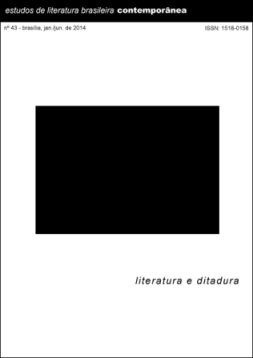O sujeito-escritor e as transformações no campo literário:
o caso Cristovão Tezza
DOI:
https://doi.org/10.1590/S2316-40182014000100016Abstract
Quando se pensa em movimentos no campo literário brasileiro, costuma-se mencionar a emergência de novos agentes que, na melhor das hipóteses, irão compartilhar a esfera pública de criação e do debate em torno das obras. No entanto, tal ideia de inclusão esconde a disputa mais pungente pelo seu espaço central ”“ o qual, obviamente, não inclui a diversidade indiscriminadamente. Novos agentes pressupõem a substituição de velhos agentes, ou de modos tradicionais de produção literária. Assim, identificamos na autobiografia literária de Cristovão Tezza, O espírito da prosa, um exemplo de reação do centro a movimentos que, de uma forma ou de outra, deturpam certo conceito de prática literária ali defendida, e que tem sua chave no elogio do “sujeito-escritor”, conforme terminologia do próprio Tezza.
Downloads
References
ADORNO, Theodor W (2003). Posição do narrador no romance contemporâneo. In: Notas de literatura I. Tradução de Jorge M. B. de Almeida. São Paulo: Duas Cidades, Editora 34.
ALENCAR, José de (2005). Como e porque sou romancista. Curitiba: Editora UFPR.
AULLÓN DE HARO, Pedro (2005). El género ensayo, los géneros ensayísticos y el sistema de gêneros. In: CERVERA, Vicente; HERNÁNDEZ, Belén; ADSUAR, Maria Dolores (orgs.). El ensayo como género literário. Múrcia: Universidad de Murcia, Servicio de Publicaciones.
BOURDIEU, Pierre (1996). As regras da arte: gênese e estrutura do campo literário. Tradução de Maria Lúcia Machado. São Paulo: Companhia das Letras.
DALCASTAGNÈ, Regina (2005). A personagem no romance brasileiro contemporâneo: 1990-2004. Estudos de Literatura Brasileira Contemporânea, Brasília, n. 26, p. 13-71.
LIMA, Luiz Costa (2005). Limites da voz. Rio de Janeiro: Topbooks.
PERRAULT, Charles (2011). Paralelo entre os antigos e os modernos. In: SOUZA, Roberto Acízelo de (org.). Uma ideia moderna de literatura: textos seminais para os estudos literários (1688-1922). Chapecó: Argos.
HIRSCHMAN, Albert O. (1992). A retórica da intransigência: perversidade, utilidade, ameaça. Tradução de Tomás Rosa Bueno. São Paulo: Companhia das Letras.
WOOD, James (2011). Como funciona a ficção. Tradução de Denise Bottmann. São Paulo: Cosac Naify.
TEZZA, Cristovão (2012). O espírito da prosa: uma autobiografia literária. Rio de Janeiro: Record.
Downloads
Published
How to Cite
Issue
Section
License
Authors who publish in this journal agree to the following terms:
a) The authors maintain the copyright and grant the journal the right of first publication, the work being simultaneously licensed under the Creative Commons Attribution License-Non Commercial 4.0 which allows the sharing of the work with acknowledgment of the authorship of the work and publication this journal.
b) Authors are authorized to enter into additional contracts separately, for non-exclusive distribution of the version of the work published in this journal (eg publish in institutional repository or as a book chapter), with authorship recognition and publication in this journal.
c) Authors are allowed and encouraged to publish and distribute their work online (eg in institutional repositories or on their personal page) after the editorial process, as this can generate productive changes, as well as increase the impact and citation of published work (See The Effect of Free Access).
d) The authors of the approved works authorize the magazine to, after publication, transfer its content for reproduction in content crawlers, virtual libraries and the like.
e) The authors assume that the texts submitted to the publication are of their original creation, being fully responsible for their content in the event of possible opposition by third parties.


